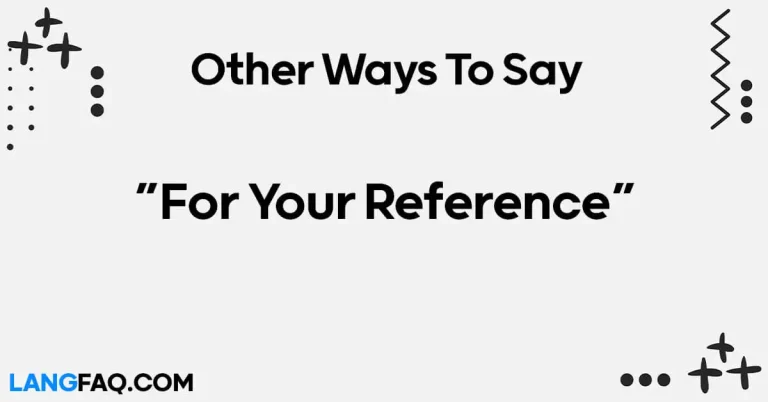Welcome to a linguistic journey where we explore 12 creative alternatives to the familiar phrase “Please Let Me Know if You Need Anything.” Effective communication involves using diverse expressions, and in this article, we’ll delve into various ways to extend help graciously. Let’s enrich your vocabulary and refine your interactions.
12 Other Ways to Say “Please Let Me Know if You Need Anything”
Here are 12 alternative ways to say “Please Let Me Know if You Need Anything”:
- Feel Free to Reach Out
- I’m Here for Anything You Require
- If You Require Assistance, Just Give Me a Nudge
- Don’t Hesitate to Ask for Help
- I’m at Your Service for Anything You Might Need
- Should You Need Anything, I’m Available
- Tell Me if There’s Anything I Can Do for You
- Feel at Liberty to Request Support
- If There’s Anything You Need Support With, Let Me Know
- I’m Here to Assist You in Any Way Possible
- Let Me Know How I Can Support You
- Should You Have Any Needs, Please Inform Me
Here’s a table with meanings and examples for the 12 alternative ways to say “Please Let Me Know if You Need Anything”:
| Expression | Meaning | Example |
|---|---|---|
| Feel Free to Reach Out | Encouraging someone to contact you without hesitation | “Feel free to reach out if you have any questions.” |
| I’m Here for Anything You Require | Expressing availability and readiness to assist | “I’m here for anything you require, just let me know.” |
| If You Require Assistance, Just Give Me a Nudge | Offering help and signaling openness | “If you require assistance, just give me a nudge.” |
| Don’t Hesitate to Ask for Help | Urging someone not to be shy about seeking assistance | “Don’t hesitate to ask for help if you need it.” |
| I’m at Your Service for Anything You Might Need | Offering oneself for various needs | “I’m at your service for anything you might need.” |
| Should You Need Anything, I’m Available | Communicating readiness for support | “Should you need anything, I’m available to assist.” |
| Tell Me if There’s Anything I Can Do for You | Offering assistance and expressing openness | “Tell me if there’s anything I can do for you.” |
| Feel at Liberty to Request Support | Encouraging someone to feel free in seeking help | “Feel at liberty to request support whenever needed.” |
| If There’s Anything You Need Support With | Expressing openness to provide support | “If there’s anything you need support with, let me know.” |
| I’m Here to Assist You in Any Way Possible | Offering assistance in various capacities | “I’m here to assist you in any way possible.” |
| Let Me Know How I Can Support You | Inviting communication about specific support needs | “Let me know how I can support you in this matter.” |
| Should You Have Any Needs, Please Inform Me | Encouraging communication about any needs | “Should you have any needs, please inform me.” |
These alternative expressions provide a diverse range of ways to convey the willingness to help or support others. Whether in a formal or informal context, having an array of phrases can enhance communication and strengthen relationships by demonstrating genuine availability and concern.
Is It Correct to Say “Please Let Me Know if You Need Anything”?
Yes, the phrase “Please Let Me Know if You Need Anything” is grammatically correct and widely used. It is a polite and considerate way to offer assistance or support to someone. The sentence is well-structured and conveys a willingness to help, making it suitable for various contexts, whether in a professional or personal setting.
However, as demonstrated in the earlier sections of the article, there are numerous alternative expressions that can be used to convey the same message with a touch of variety. These alternatives add richness to your communication and allow you to tailor your message based on the specific context or relationship.
In summary, while “Please Let Me Know if You Need Anything” is perfectly correct, exploring alternative phrases can enhance your communication skills and provide you with a diverse range of options to express your willingness to assist.
Professional Mail Example With “Please Let Me Know if You Need Anything”
Subject: Ready to Support Your Project
Dear [Recipient’s Name],
I trust this email finds you well. As we embark on this new project together, I wanted to reach out and express my commitment to its success.
Please let me know if you need anything throughout the process. Whether it’s additional resources, clarification on certain aspects, or any support you may require, I am here to assist. Your success is paramount, and I am dedicated to ensuring a smooth and efficient collaboration.
I look forward to our continued partnership and the successful execution of this project.
Best regards,
[Your Full Name] [Your Position] [Your Company] [Your Contact Information]
Feel Free to Reach Out
In our journey of alternative phrases, we begin with “Feel Free to Reach Out.” This expression is an open invitation for communication, making it ideal for various scenarios, both formal and informal. When engaging with colleagues or friends, using this phrase conveys approachability and willingness to assist.
Example Sentence: Colleague Scenario: “Feel free to reach out if you have any queries regarding the upcoming project deadlines.”
Friend Scenario: “Hey, feel free to reach out whenever you want to catch up. I’m always here for a chat!”
Email Sample:
Subject: Open Invitation for Any Questions
Dear [Recipient],
I hope this email finds you well. I wanted to let you know that if you have any questions or concerns, feel free to reach out to me. I’m here to assist in any way I can.
Best regards, [Your Name]
Variations:
- Colleague Variation: “Feel free to reach out for work-related matters.”
- Friend Variation: “Feel free to reach out anytime for a friendly conversation.”
Dictionary Insight: According to the Cambridge Dictionary, “Feel free to reach out” is an idiomatic expression used to give someone permission to contact you.
When to Use:
- Use in professional emails to colleagues or clients.
- Suitable for informal communication with friends.
Pros:
- Creates an open and approachable communication environment.
- Encourages interaction and questions.
Cons:
- May sound too formal in extremely casual settings.
Tips:
- Adapt the level of formality based on the context.
I’m Here for Anything You Require
Moving on, let’s explore the phrase “I’m Here for Anything You Require.” This expression conveys a strong sense of availability and commitment to providing assistance. It is versatile and can be used in both professional and personal relationships.
Example Sentence: Professional Context: “As your mentor, I want to assure you that I’m here for anything you require during your onboarding process.”
Personal Context: “Friend, I’m here for anything you require while you’re going through a tough time. Just let me know how I can help.”
Email Sample:
Subject: Here to Support You
Dear [Recipient],
I wanted to reach out and remind you that I’m here for anything you require. Whether it’s work-related or personal, don’t hesitate to reach out. Your well-being is important to me.
Warm regards, [Your Name]
Variations:
- Mentor Variation: “I’m here for anything you require to excel in your professional journey.”
- Friend Variation: “I’m here for anything you require, whether it’s a listening ear or a helping hand.”
Dictionary Insight: According to Merriam-Webster, the word “require” emphasizes a need for something and is often used in a formal context.
When to Use:
- Appropriate for mentor-mentee relationships.
- Suitable for expressing support in personal friendships.
Pros:
- Demonstrates strong commitment and support.
- Suitable for both formal and informal settings.
Cons:
- May sound too formal in extremely casual conversations.
Tips:
- Gauge the level of formality based on the relationship dynamics.
If You Require Assistance, Just Give Me a Nudge
Next on our linguistic exploration is the phrase “If You Require Assistance, Just Give Me a Nudge.” This expression adds a touch of informality while conveying readiness to help. It is versatile, fitting seamlessly into both professional and personal conversations.
Example Sentence: Colleague Interaction: “If you require assistance with the client presentation, just give me a nudge. I’m happy to collaborate.”
Friend Interaction: “Planning an event can be overwhelming. If you require assistance, just give me a nudge. I’m here to help!”
Email Sample:
Subject: Assistance Offer
Dear [Recipient],
I hope this email finds you well. I wanted to let you know that if you require assistance with the upcoming project, just give me a nudge. I’m here to support and collaborate.
Best regards, [Your Name]
Variations:
- Colleague Variation: “If you require assistance with the budget report, just give me a nudge.”
- Friend Variation: “If you require assistance with moving, just give me a nudge. I’m ready to help!”
Dictionary Insight: The phrase “give me a nudge” is an idiom, meaning to remind or prompt someone subtly.
When to Use:
- Suitable for professional settings, indicating collaboration.
- Ideal for offering support in personal relationships.
Pros:
- Infuses a friendly tone into formal contexts.
- Clearly expresses willingness to assist.
Cons:
- May be too casual for highly formal situations.
Tips:
- Use this expression when you want to offer help in a lighthearted manner.
Don’t Hesitate to Ask for Help
Now, let’s delve into the straightforward yet impactful phrase “Don’t Hesitate to Ask for Help.” This expression encourages open communication and is especially effective in professional relationships where teamwork is crucial.
Example Sentence: Manager to Team: “Don’t hesitate to ask for help if you’re facing challenges with the new software. We’re here to support each other.”
Friend to Friend: “Life can be overwhelming; don’t hesitate to ask for help when you need it. We’re in this together.”
Email Sample:
Subject: Open Invitation for Support
Dear [Recipient],
I trust this message finds you well. In our collaborative work, please don’t hesitate to ask for help if you encounter any difficulties. We value teamwork and are here to support one another.
Best regards, [Your Name]
Variations:
- Manager Variation: “In this team, don’t hesitate to ask for help. We thrive on collaboration.”
- Friend Variation: “Navigating through tough times can be hard. Don’t hesitate to ask for help from friends who care.”
Dictionary Insight: According to Oxford Languages, “hesitate” means to pause before saying or doing something, often out of uncertainty.
When to Use:
- Appropriate for professional environments to foster teamwork.
- Suitable for personal relationships, emphasizing mutual support.
Pros:
- Promotes a culture of openness and teamwork.
- Encourages individuals to seek assistance without reservation.
Cons:
- Might be considered too formal in extremely casual contexts.
Tips:
- Use this phrase to create a supportive atmosphere in work or personal settings.
I’m at Your Service for Anything You Might Need
Now, let’s explore the phrase “I’m at Your Service for Anything You Might Need.” This expression is a polite and formal way to offer assistance, suitable for various professional contexts where professionalism and reliability are emphasized.
Example Sentence: Service Provider to Client: “As your dedicated account manager, I’m at your service for anything you might need regarding our products or services.”
Friend in Need: “Going through a tough time? I’m at your service for anything you might need—whether it’s a listening ear or practical help.”
Email Sample:
Subject: Dedicated Support
Dear [Recipient],
I hope this email finds you well. As your designated point of contact, I want to assure you that I’m at your service for anything you might need. Feel free to reach out at any time.
Best regards, [Your Name]
Variations:
- Customer Service Variation: “As part of our commitment to exceptional service, we’re at your service for anything you might need.”
- Friend Variation: “Friendship is about being there for each other. I’m at your service for anything you might need.”
Dictionary Insight: The phrase “at your service” originates from the formal language used by servants, indicating readiness to serve or assist.
When to Use:
- Appropriate for professional service-oriented roles.
- Suitable for expressing sincere support in personal relationships.
Pros:
- Conveys a high level of professionalism and dedication.
- Assures the recipient of reliable support.
Cons:
- May sound too formal for very casual relationships.
Tips:
- Use this expression when you want to highlight your commitment to providing assistance.
Should You Need Anything, I’m Available
Let’s explore the phrase “Should You Need Anything, I’m Available.” This expression combines formality with a personal touch, making it versatile for both professional and personal relationships. It subtly conveys a readiness to assist without imposing.
Example Sentence: Colleague Interaction: “In preparation for the client meeting, should you need anything, I’m available to help with research or any additional materials.”
Supportive Friend: “I heard about your challenges. Should you need anything, I’m available to lend an understanding ear or practical assistance.”
Email Sample:
Subject: Support Offer
Dear [Recipient],
I trust this message finds you in good spirits. As we navigate through our projects, I want you to know that should you need anything, I’m available to provide support. Your success is important to me.
Warm regards, [Your Name]
Variations:
- Manager Variation: “As your manager, should you need anything, I’m available to discuss strategies or provide guidance.”
- Friend Variation: “Friendship goes beyond good times. Should you need anything, I’m available for support.”
Dictionary Insight: The phrase “should you” is a formal and polite way of expressing a condition or possibility.
When to Use:
- Appropriate for professional contexts where formality is valued.
- Suitable for expressing genuine support in personal relationships.
Pros:
- Balances formality with a personal touch.
- Demonstrates a sincere commitment to being available.
Cons:
- May be perceived as too formal in extremely casual settings.
Tips:
- Use this expression when you want to maintain a professional tone while offering support.
Tell Me if There’s Anything I Can Do for You
Moving on, let’s explore the phrase “Tell Me if There’s Anything I Can Do for You.” This expression directly extends an offer of assistance, creating an open line of communication. It’s suitable for both professional and personal contexts, emphasizing genuine concern.
Example Sentence: Workplace Support: “Amidst the project deadlines, tell me if there’s anything I can do for you. I’m here to ensure our team succeeds.”
Supportive Neighbor: “Going through a tough time? Tell me if there’s anything I can do for you—whether it’s running errands or just being there to talk.”
Email Sample:
Subject: Here to Assist
Dear [Recipient],
I hope this message finds you well. As we navigate through our tasks, tell me if there’s anything I can do for you. Whether it’s additional resources or support, I’m here to assist.
Best regards, [Your Name]
Variations:
- Team Collaboration Variation: “In our collaborative efforts, tell me if there’s anything I can do for you. Let’s ensure our team’s success.”
- Friend Variation: “Friendship is about supporting each other. Tell me if there’s anything I can do for you during this challenging time.”
Dictionary Insight: The phrase “tell me if” is an idiomatic expression that emphasizes openness to communication.
When to Use:
- Appropriate for professional environments where teamwork is essential.
- Suitable for expressing sincere support in personal relationships.
Pros:
- Directly communicates a willingness to assist.
- Creates an atmosphere of open communication.
Cons:
- May feel too direct in extremely casual settings.
Tips:
- Use this expression when you want to be straightforward and clear about your offer of assistance.
Feel at Liberty to Request Support
Now, let’s explore the phrase “Feel at Liberty to Request Support.” This expression combines formality with an encouraging tone, making it suitable for professional environments where a level of decorum is maintained.
Example Sentence: Professional Interaction: “As we work on the project, feel at liberty to request support. Our success is a collective effort, and I’m here to contribute.”
Friend Interaction: “Life’s challenges can be daunting. Feel at liberty to request support from friends who care. We’re here for each other.”
Email Sample:
Subject: Support Offer
Dear [Recipient],
I trust this email finds you well. In our collaborative efforts, feel at liberty to request support whenever needed. Together, we can achieve great things.
Warm regards, [Your Name]
Variations:
- Manager Variation: “As your manager, feel at liberty to request support. Your success is important to us.”
- Friend Variation: “Friendship is built on support. Feel at liberty to request support whenever you need it.”
Dictionary Insight: The phrase “feel at liberty” is an idiomatic expression meaning to feel free or comfortable.
When to Use:
- Appropriate for professional settings where a polite tone is valued.
- Suitable for expressing encouragement and support in personal relationships.
Pros:
- Blends formality with a supportive tone.
- Encourages open communication.
Cons:
- May sound too formal in extremely casual settings.
Tips:
- Use this expression to convey a sense of openness and encouragement while maintaining professionalism.
If There’s Anything You Need Support With, Let Me Know
Our exploration continues with the phrase “If There’s Anything You Need Support With, Let Me Know.” This expression is both versatile and considerate, offering assistance while allowing the recipient to define their needs. It’s suitable for both formal and informal contexts.
Example Sentence: Workplace Collaboration: “In our collaborative efforts, if there’s anything you need support with, let me know. I’m committed to our collective success.”
Personal Support: “Life’s journey can be challenging. If there’s anything you need support with, let me know. I’m here for you, no matter what.”
Email Sample:
Subject: Support Offer
Dear [Recipient],
I hope this message finds you in good spirits. As we embark on our tasks, if there’s anything you need support with, let me know. Our collective success is a priority.
Warm regards, [Your Name]
Variations:
- Project Team Variation: “As we navigate through our project, if there’s anything you need support with, let me know. We’re in this together.”
- Friend Variation: “Friendship is about supporting each other. If there’s anything you need support with, let me know. I’ve got your back.”
Dictionary Insight: The phrase “let me know” is a common idiomatic expression that invites open communication.
When to Use:
- Appropriate for professional environments, promoting teamwork.
- Suitable for expressing genuine support in personal relationships.
Pros:
- Emphasizes a commitment to collective success.
- Allows the recipient to define their needs.
Cons:
- May be perceived as too formal in extremely casual settings.
Tips:
- Use this expression when you want to offer assistance while allowing the recipient to specify their needs.
I’m Here to Assist You in Any Way Possible
Now, let’s explore the phrase “I’m Here to Assist You in Any Way Possible.” This expression is straightforward, emphasizing the speaker’s readiness to provide comprehensive assistance. It’s suitable for various professional and personal contexts.
Example Sentence: Manager to Team: “As your manager, I want to assure you that I’m here to assist you in any way possible. Our team’s success is my priority.”
Friend Offering Support: “Life’s challenges can be overwhelming. I’m here to assist you in any way possible—whether it’s practical help or emotional support.”
Email Sample:
Subject: Support Assurance
Dear [Recipient],
I trust this email finds you well. In our collaborative efforts, I want to emphasize that I’m here to assist you in any way possible. Your success matters.
Best regards, [Your Name]
Variations:
- Professional Mentor Variation: “As your mentor, I’m here to assist you in any way possible in your professional development.”
- Friend Variation: “Friendship is about being there for each other. I’m here to assist you in any way possible during tough times.”
Dictionary Insight: The phrase “in any way possible” emphasizes a comprehensive and unlimited willingness to provide support.
When to Use:
- Suitable for professional settings where a strong commitment is valued.
- Ideal for expressing genuine and comprehensive support in personal relationships.
Pros:
- Conveys a strong commitment to assistance.
- Demonstrates a broad and unlimited willingness to help.
Cons:
- May sound too formal in extremely casual settings.
Tips:
- Use this expression when you want to emphasize a broad and unlimited commitment to assistance.
Let Me Know How I Can Support You
Our exploration concludes with the phrase “Let Me Know How I Can Support You.” This expression places the emphasis on the recipient’s needs, allowing them to define the support required. It’s adaptable and suitable for both professional and personal relationships.
Example Sentence: Team Collaboration: “As we work on this project, let me know how I can support you. Our collective success is built on mutual assistance and collaboration.”
Friend Offering Help: “Life’s journey can be unpredictable. Let me know how I can support you—whether it’s by lending a hand or simply being a supportive friend.”
Email Sample:
Subject: Offering Support
Dear [Recipient],
I hope this message finds you well. In our collaborative efforts, I want to reiterate: let me know how I can support you. Your success and well-being are priorities.
Warm regards, [Your Name]
Variations:
- Managerial Support Variation: “As your manager, let me know how I can support you in achieving your professional goals.”
- Friend Variation: “Friendship thrives on support. Let me know how I can support you during both good and challenging times.”
Dictionary Insight: The phrase “let me know” is a common idiomatic expression that invites open communication.
When to Use:
- Appropriate for professional settings, promoting mutual assistance.
- Suitable for expressing genuine support in personal relationships.
Pros:
- Prioritizes the recipient’s needs and preferences.
- Demonstrates openness and a willingness to adapt.
Cons:
- May be perceived as too formal in extremely casual settings.
Tips:
- Use this expression when you want to give the recipient control over defining their support needs.
FAQs
Q: Are these alternatives suitable for both personal and professional settings? Yes, the suggested alternatives cater to a range of contexts, ensuring versatility in your communication.
Q: Can I use these phrases in written communication? Absolutely! These alternatives work well in both verbal and written communication, adding a touch of creativity to your language.
Q: Which phrase is best for expressing immediate availability? “Count on Me” and “I’m at Your Disposal” effectively convey immediate readiness to assist.
Q: Are there cultural considerations for using these alternatives? While generally applicable, it’s essential to consider cultural nuances. Opt for phrases that align with the tone and formality of the specific cultural context.
Q: How can I seamlessly incorporate these alternatives into conversations? Practice using these phrases in casual conversations to make them feel natural. Soon, they’ll become a seamless part of your communication style.
Q: Are there situations where using the original phrase is more appropriate? Yes, in formal or traditional settings, sticking to “Please Let Me Know if You Need Anything” may be more appropriate. Gauge the context to determine the best approach.
Conclusion
Communication is an art, and refining it involves embracing diverse expressions. The 12 alternatives explored here offer a spectrum of options for conveying assistance. Remember, the key is authenticity—choose the phrase that aligns with your style and the context. Enhance your communication skills and foster stronger connections using these nuanced expressions.







